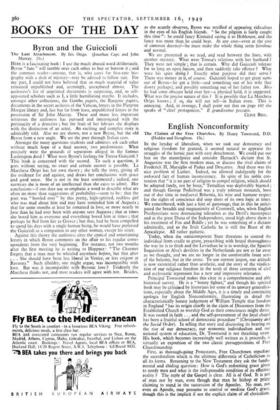BOOKS OF THE DAY
Byron and the Guiccioli
HERE is a fascinating book : I use the much abused word deliberately. Byron " fans " will tumble over each other to buy or borrow it ; and the common reader—anyone, that is, who cares for first-rate bio- graphy with a dash of mystery—may be advised to follow suit. For my part, I could not have believed that so much material of value remained unpublished and, seemingly, unexplored almost. The authoress's list of unprinted documents is surprising, and, to self- appointed scholars such as I, a little humiliating maybe. It includes, amongst other collections, the Gamba papers, the Rangone papers, documents in the secret archives of the Vatican, letters in the Pierpont Morgan library and, last but far from least, unpublished letters in the possession of Sir John Murray. These and many less important witnesses the authoress has pursued and interrogated with the pertinacity of a detective ; but the fruit of her labours she displays with the distinction of an artist. An exciting and complex story is admirably told. Also we are shown, not a new Byron, but the old Byron from a new angle. We see the poet through Italian eyes.
Amongst the many questions students and admirers ask each other without much hope of a final answer, two predominate. What precisely were the grounds of separation alleged in the famous Lushington deed ? What were Byron's feelings for Teresa Guiccioli ? This book is concerned with the second. To such a question, it goes without saying, no exact and certain answer is possible. La Marchesa Origo has her own theory ; she tells the story, giving all the evidence for and against, and draws her conclusions with grace and good sense. She is not in the least sentimental ; indeed, one Surmises she is more of an intellectual than she cares to admit. Her conclusions—if one dare use so emphatic a word to describe what are often no more than suggestions of probability—seem to be: that the poet was " bowled over " by this pretty, high-spirited, reckless girl who was mad about him and may have reminded him of Augusta ; that for some months at least he remained in love, or more nearly in love than he had ever been with anyone save Augusta ; that at times She bored him as everyone and everything bored him at times ; that perhaps he fled from her to Greece ; but that, had he been compelled to spend his days with a single human being, he would have preferred the Guiccioli as a companion to any other woman, except his sister.
Against this theory the authoress cites the cynical and entertaining letters in which Byron comments on the affair to his regular corre- spondents from the very beginning. For instance, not two months after the first meeting he is writing to Hoppner: "The Charmer forgets that a man may be whistled anywhere before, but that after . . . She should have been less liberal in Venice, or less exigent at Ravenna." Such ribaldry, one might argue, was incompatible with love. But was it incompatible with Byronic love ? Evidently the Marchesa thinks not, and most readers will agree with her. Besides, as she acutely observes, Byron was terrified of appearing ridiculous in the eyes of his English friends. " So the pilgrim is fairly caught this time ": he could fancy Kinnaird saying it to Hobhouse, and the fancy was more thaphe could bear. At any cost—even at the cost of common decency—he must make the whole thing seem frivolous and normal.
We arc presented as we read, and read between the lines, with another mystery. What were Teresa's relations with her husband ? They were not simple ; that is certain. Why did Guiccioli tolerate for so long an open ,liaison, and then suddenly take offence ? What were his spies doing ? Exactly what purpose did they serve ? There was money in it, of course. Guiccioli hoped to get great sums out of Byron—he got a little—and something out of his wife (her dowry perhaps), and possibly something out of her father too. Also he had some obscure hold over her—a physical hold, it is suggested. What was the precise nature of this ? It is possible that La Marchesa Origo knows ; if sof she will not tell—in Italian even. This is annoying. And, in revenge, I shall point out that on page 167 she speaks of " chief protagonists." E grandissimo peccato.
CLIVE BELL.


































 Previous page
Previous page